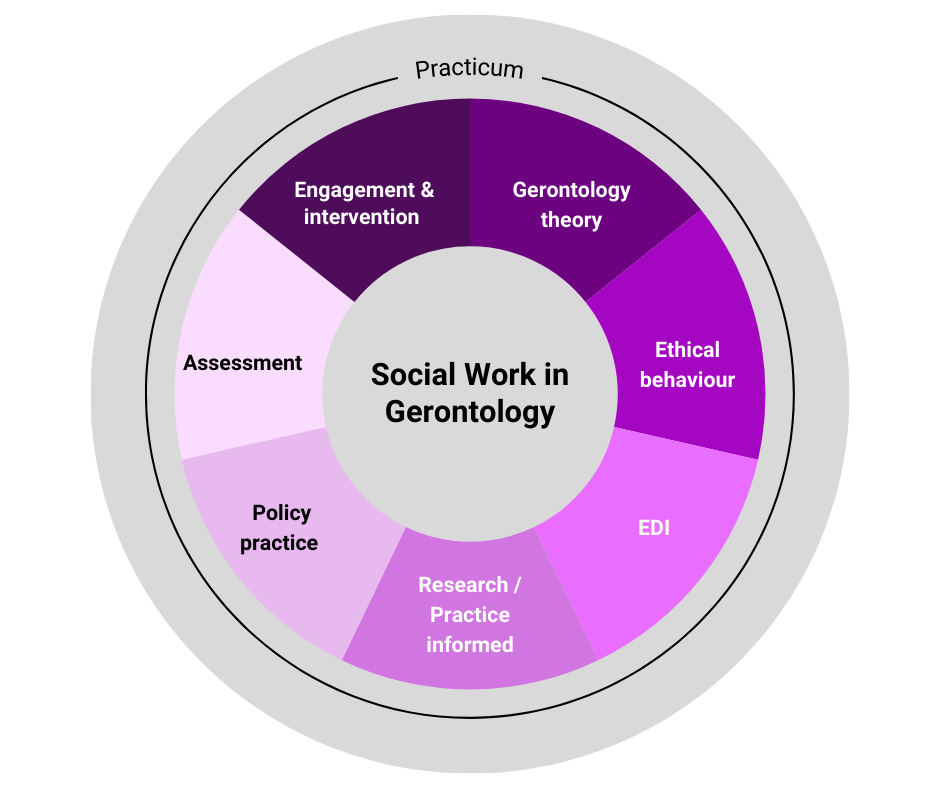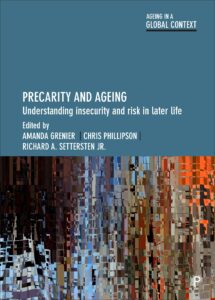Social work in gerontology
 Social workers are important agents in assisting older people and their families to meet the challenges of an aging society. In this capacity, social workers provide a variety of services and programs in the community and in institutions that are aimed at enhancing the quality of life of older adults and assisting families. Social workers also play a vital role in the development and implementation of social and economic policies at the provincial and national levels through research on aging, consultation with government and through social advocacy.
Social workers are important agents in assisting older people and their families to meet the challenges of an aging society. In this capacity, social workers provide a variety of services and programs in the community and in institutions that are aimed at enhancing the quality of life of older adults and assisting families. Social workers also play a vital role in the development and implementation of social and economic policies at the provincial and national levels through research on aging, consultation with government and through social advocacy.
Coordinator
Core faculty
Social Work in Gerontology competencies
Learn about the competencies students will acquire in the Social Work in Gerontology field of study, and the skills, courses and assessment indicators or methods associated with each.
Lecturers
Required courses
Required courses for students who began their MSW program in or after Fall 2023:
- AGE2000H Principles of Aging
- SWK4513H Knowledge Building in Social Work
- SWK4609H Clinical Social Work Practice with Older Adults (*offered as of Fall 2023)
- SWK4611H The Context of Social Work Practice with Older Adults and their Families (*offered as of Winter 2024)
- SWK4618H Special Issues in Gerontological Social Work
- SWK4702Y Social Work Practicum II
- One half-credit graduate level elective course (0.5 FCE) from the Collaborative Specialization in Aging, Palliative and Supportive Care Across the Life Course list of approved electives, excluding SWK4618H. Students may request approval in advance by the Specializations Committee of an elective course not on this list to fulfill the elective requirement
All students will complete the Collaborative Program in Aging, Palliative and Supportive Care across the Life Course with no additional course work required.
MSW Program with Advanced Standing complete the above courses plus the compulsory course SWK4510H Research for Evidence-Based Social Work Practice. SWK4510H must be completed before taking SWK4513H. Students take SWK4510H in the first term of the MSW Program.
Required courses for students who began the MSW program before Fall 2023:
*Students who started before Fall 2023 may request to opt-in to following the new requirements.
- AGE2000H Principles of Aging
- SWK4513H Knowledge Building in Social Work
- SWK4612Y Social Work and Aging: Integrated Policy and Practice (full-course)
- SWK4618H Special Issues in Gerontological Social Work
- SWK4702Y Social Work Practicum II
- Two half-credit graduate level electives of which one must be from the Collaborative Specialization in Aging, Palliative and Supportive Care Across the Life Course list of approved electives
All students will complete the Collaborative Program in Aging, Palliative and Supportive Care across the Life Course with no additional course work required.
MSW Program with Advanced Standing complete the above courses plus the compulsory course SWK4510H Research for Evidence-Based Social Work Practice. SWK4510H must be completed before taking SWK4513H. Students take SWK4510H in the first term of the MSW Program.
Related Elective Examples
- SWK4614H Social Work in Palliative Care
- SWK4634H Family Practice Across the Life Cycle: Caregiving and Older Adults
- SWK4641H Special Topics in Social Work in Gerontology: Elder Abuse
- SWK4641H Special Topics in Social Work in Gerontology: Aging and Health
The examples above of electives related to gerontology are offered most years but not every year, depending on instructor availability.
Practicum examples
- Alzheimer Society of Ontario
- Baycrest Centre
- Black Creek Community Health
- Centre Centre for Addiction and Mental Health
- Circle of Care
- Extendicare Brampton
- Family Service Toronto
- Hawthorne Place Care Centre
- LOFT Community Services
- London Health Sciences Centre
- Mount Sinai Hospital
- Runnymede Health Centre
- Southlake Regional Health Centre
- SPRINT: Senior People’s Resource Centre in North Toronto
- Sunnybrook Health Sciences Centre
- Toronto Western Hospital
- Trillium Health Partners
The above examples of practicums are offered most years but not every year, depending on supervisor availability.
Career prospects
Students may work in the areas of case management, discharge planning, senior’s mental health (i.e., depression, substance dependence), caregiver support, dementia services, policy development, service outreach, program management for services supporting older adults and their families. Alumni may work at locations such as hospitals and other healthcare centres, long-term care homes, mental health service centres and hospitals, and government offices (i.e., Veterans Affairs Canada).
What competencies can I expect to gain from this field of study?
Students in Gerontology can expect to gain the knowledge and skills necessary for assisting older individuals and their families in meeting the challenges of an aging society. Students will learn to provide a wide variety of services and programs performed in community and institutional settings that aim to improve the quality of life of older adults as well as enhance the abilities of families to provide for their aging family member’s needs. Students also learn to engage in advocacy, consult with government and community partners, conduct aging-related research, and develop and implement policy on both the provincial and national level.




